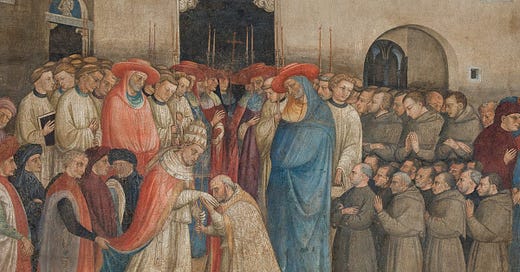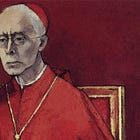Papal elections without the cardinals? – St Robert Bellarmine
It's sometimes said that if all cardinals died, defected or disappeared during a vacancy of the Holy See, there would be no way to elect a new pope. St Robert Bellarmine gives this idea the lie.

This is the first in a series of texts from theologians, which we are publishing on the topic of “Papal elections in extraordinary circumstances”, and the related topic of how the Church might be during an extended papal interregnum. To this end, we are republishing Mr J. Larrabee’s translation of St Robert Bellarmine on this very topic. This text was originally published on The Bellarmine Forums and is republished with the permission of the owner.
Editors’ Notes
We are sometimes told that, if it there were to be an extended vacancy of the Apostolic See, or if there were to be no more cardinals, then we would be in a “dead end,” with no way of obtaining or electing a new successor of St Peter.
The argument often then proceeds: But there must be perpetual successors to St Peter; therefore, it cannot be the case that we are in an extended vacancy of the Apostolic See.
These premises are also sometimes used to bolster particular theories about the status of the current putative cardinals.
Without proffering any opinion on the legitimacy of the current putative college of cardinals, their right to vote, or anything else, we can note that these arguments depend on premises which were by no means obvious to theologians writing prior to our time. There have been several great theologians in history who have considered similar (even if not identical) situations to our own, without feeling obliged to form such conclusions.
Regarding Bellarmine’s text: it is not clear that he concedes that all the cardinals could die or disappear. But he is at least considering a hypothetical circumstance, in which both natural and divine law would apply: as a perfect society, the Church must be able to provide herself with a visible head somehow or other.
No doubt there are very many practical problems when it comes to applying the ideas below to our current situation. Others may object that this is just Bellarmine’s opinion, and that other theologians hold other opinions. These points may be correct, but they are not relevant.
As implied by the idea of a series of such texts, we are not publishing this text as if it settles the question. We are merely showing that it is false to say that there are no solutions to a long interregnum. Even a solution which is practically unworkable (at least, at present) refutes such claims.
Nor are we declaring how the current crisis will end, and a new Roman Pontiff be elected. We do not feel any need to adopt a given opinion on this topic, or present a “plan” to restore the Church – as if it belonged to any of us to do so.
It seems wise to have as many ideas on the table as possible. It is not obvious that there can be only one single way out of our situation; nor does it seem that the various parties at the Council of Constance were agreed on what they should do (or what was happening at the time) with regards to the three claimants, or on the exact mechanism by which the later Pope Martin V was elected.
In any case, the point is this: Bellarmine and others have long considered how the Church might obtain a pope without any cardinals, and far from denying the possibility outright, they have presented solutions. This is sufficient to refute the objection at hand.
St Robert Bellarmine on Extraordinary Papal Elections
Bellarmine’s Controversies
De clericis
Translated by Mr James Larrabee, with his comments.
Some line breaks added by The WM Review
Reprinted from The Bellarmine Forums with permission
Book I, Chapter 10
Eighth Proposition
If there were no papal constitution on the election of the Supreme Pontiff; or if by some chance all the electors designated by law, that is, all the Cardinals, perished simultaneously, the right of election would pertain to the neighboring bishops and the Roman clergy, but with some dependence on a general council of bishops.
In this proposition, there does not appear to be universal agreement. Some think that, exclusive of positive law, the right of election would devolve on a Council of Bishops, as Cajetan, tract. De Potestate Papae & Concilii, cap. 13 & 21 & Francis Victoria, relect. 2. quest. 2. De potestate Ecclesiae.
Others, as Sylvester relates s.v. Excommunicatio, 9. sec. 3, teach that in that case the right of election pertains to the Roman clergy.
But these two opinions can be reconciled. Without a doubt, the primary authority of election in that case pertains to a Council of Bishops; since, when the Pontiff dies, there is no higher authority in the Church than that of a general Council: and if the Pontiff were not the Bishop of Rome, or any other particular place, but only the general Pastor of the whole Church, it would pertain to the Bishops either to elect his successor, or to designate the electors: nevertheless, after the Pontificate of the world was joined to the bishopric of the City [posteaquam unitus est Pontificatus orbis Episcopatui Urbis], the immediate authority of electing in that case would have to be permitted by the bishops of the whole world to the neighboring bishops, and to the clerics of the Roman Church, which is proved in two ways.
First, because the right of election was transferred from all the neighboring bishops and the Roman clergy to the Cardinals, who are a certain part of the bishops and clergy of the Roman Church; therefore, when the Cardinals are lacking, the right of election ought to return to all the bishops and clergy of the Roman Church.
Second, because this is a most ancient custom (as we showed above from Cyprian), that the neighboring bishops, in the presence of the clergy, should elect both the Bishop of Rome and others also. And it is unheard of that the Bishops or Archbishops of the whole world should meet for the election of the Supreme Pontiff, except in a case where it is doubtful who should be the legitimate electors. For this doubt ought to be resolved by a general Council, as was done in the Council of Constance.
[This is the entire text of chap. 10.]
Comments by Mr James Larrabee
It should be noted that in this book, St. Robert treats first of the election of bishops, refuting the Protestant theory of popular election (revived by modern liberal “Catholics”) at considerable length (chap. 7). He then deals in detail with the election of the Supreme Pontiff (chap. 9). The proposition at the head of chapter 7 reads:
“The right of electing the Supreme Pontiff, and the other Pastors and Ministers of the Church, does not belong to the people by divine right. But if, at any time, the people had any power in this matter, that was entirely from the connivance or the concession of the Pontiffs.”
Another point to keep in mind in this context is that the neighboring bishops to the see of Rome are actually the Cardinal Bishops, the bishops of the suburbicarian sees. These have been associated in the government of the Church by the Popes from the earliest times. On this Bellarmine says in chap. 9 (in which he is concerned to show that the constituted method of papal election by the Cardinals, while not of divine law, is the best and should be retained):
“The second manner [of electing a Bishop] was, that all the Bishops of the same province, or the majority of them, should elect the Bishop, after, however, requesting the testimony and consent of the Clergy and people of the place to which the Bishop is being given: and in the same manner were elected Metropolitans, Patriarchs, and the Supreme Pontiff himself, namely by the neighboring or provincial Bishops. And this was the most ancient manner…”
Further down he says:
“The second manner is found in this form [of papal election, that is, election by the Cardinals], insofar as the principle element in it is concerned; for the neighboring Bishops now elect as they then elected, namely the six Cardinal Bishops.”
James Larrabee
A.M.D.G.
Papal elections without the cardinals, and the state of the Church during a papal interregnum
HELP KEEP THE WM REVIEW ONLINE!
As we expand The WM Review we would like to keep providing free articles for everyone. If you have benefitted from our content please do consider supporting us financially.
A subscription from you helps ensure that we can keep writing and sharing free material for others.
Plus, you will get access to our exclusive members-only material!
Thank you!
Follow on Twitter and Telegram:



